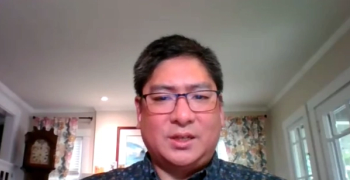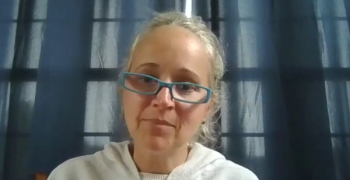
Learn the critical factors in determining prophylaxis for venous thromboembolism, a frequent and serious complication for patients with cancer.

Learn the critical factors in determining prophylaxis for venous thromboembolism, a frequent and serious complication for patients with cancer.

Heather J. Jackson, PhD, APRN, FNP-BC, NEA-BC, FAA-NP, shared a review of supportive oncology practices at the 2025 School of Nursing Oncology.

Heather Jackson, PhD, APRN, FNP-BC, NEA-BC, FAA-NP, explains the utility of a holistic approach to oncology care.

Expert Kelsey Martin shares nursing insights on balancing glucose control and GI side effects when caring for patients on PI3K and AKT inhibitors.

Nurses must stay up to date on novel agents and their toxicities to properly monitor for and manage immune effector cell-associated neurotoxicity syndrome.

Nurse practitioner Beth Faiman shares strategies to reduce infection risk in patients receiving bispecific antibodies for multiple myeloma.

CRS is a common but manageable toxicity of CAR T-cell therapy and bispecific antibodies. Learn strategies to identify and manage this adverse effect.

Nurse practitioner Beth Faiman outlines nursing strategies to monitor, assess, and manage toxicities associated with talquetamab in multiple myeloma.

Beyond administering CAR T-cell therapy and bispecifics, oncology nurses must apply proactive, supportive care and an understanding of complex treatments.

Michael Lai, ARNP, explained the mechanism of action of PARP inhibitors for the treatment of patients with prostate cancer.

The Immune Effector Cell Encephalopathy score and keeping a close eye on patients’ symptoms are critical when monitoring for potential ICANS during lymphoma treatment.

A multidisciplinary approach to adverse effect management addresses many needs patients with gynecologic cancers may have while undergoing treatment.

Applying diversity, equity, and inclusion to cancer clinics can help oncology nurses and APPs make an impact on patient care and research.

An expert explained how oncology nurses and APPs should stay informed on the latest genetic mutations that targeted therapies focus in on for non-small cell lung cancer.

An expert discusses recent advancements in breast cancer treatment, focusing on the addition of CDK4/6 inhibitors for high-risk ER-positive, HER2-negative breast cancer.

Paula Anastasia, RN, MN, AOCN, underscores the value of genetic testing in personalizing treatment decisions in ovarian maintenance therapy.

Leslie Smith, DNP, RN, APRN-CNS, BMTCN, AOCNS, discusses new therapies and treatment selection in the lymphoma landscape.

Laura Wood discusses the successful integration of avelumab, erdafitinib, and enfortumab vedotin-ejfv into oncology nursing practice.

The growing availability of biomarkers has led to the advent of more targeted therapies such as the antibody-drug conjugates (ADCs) fam-trastuzumab deruxtecan-nxki, ado-trastuzumab emtansine, and sacituzumab govitecan-hziy.

Stephanie Jackson, DNP, MSN, RN, AOCNP, BMTCN, discusses the trajectory of targeted and CAR T-cell therapies such as ivosidenib and brexucabtagene autoleucel, and what nurses need to know about these treatments to be able to practice at the top of their licensure.

Avelumab, erdafitinib, and enfortumab vedotin-ejfv are 3 critical drugs in the treatment of urothelial cancer with distinct safety profiles, according to a presentation at the 6th Annual School of Nursing Oncology™ Meeting.

In a presentation at the 6th Annual School of Nursing Oncology™, Laura Wood, RN, MSN, OCN, highlights key nurse takeaways with VEGF TKI/immune checkpoint inhibitor therapy for patients with renal cell carcinoma.

At the 6th Annual SONO meeting, Kelley A. Rone, DNP, RN, AGNP-C, reviewed evidence supporting molecular testing in patients with colorectal cancer.

Paula Anastasia, RN, MN, AOCN, highlights circumstances in which patients may not be eligible to receive benefit with a PARP inhibitor.

Treatments options for various histologies of leukemia are expanding with FDA approvals for drugs such as the combination of ivosidenib/azacitidine and the CAR T-cell therapy brexucabtagene autoleucel.

Beth Sandy, MSN, CRNP, discusses the application of 2 FDA approved drugs for patients with non–small cell lung cancer and an exon 20 insertion mutation.

At the 6th Annual SONO meeting, Beth Sandy, MSN, CRNP, reviewed available treatment options for patients with identified driver mutations in non–small cell lung cancer.

Paula Anastasia, RN, MN, AOCN, discusses the value of germline testing and the role of maintenance PARP inhibitor therapy in optimized ovarian cancer treatment.

Kelley A. Rone, DNP, RN, ADNP-c, highlights the pivotal trials assessing the role of immunotherapy in gastrointestinal cancer and what the findings may mean for oncology nurses.

Faith Mutale, CRNP, discusses the paradigm shift needed in oncology to address clinical trial enrollment hesitancy among African American patients with lung cancer.